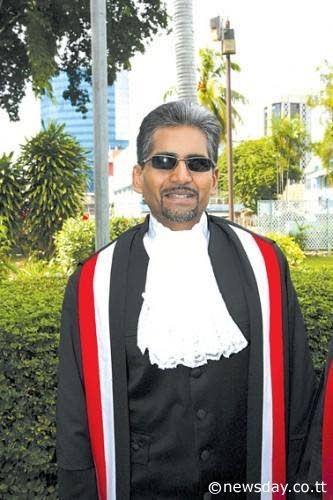Judge to rule on suspension of the LPA ruling

JUSTICE Vasheist Kokaram will give his decision on Wednesday on a request by the Attorney General (AG) and the Law Association (LATT) to suspend the order in which he deemed section 15(IA) of the Legal Profession Act (LPA) unconstitutional, as it discriminates against non-nationals who want to practise law in TT.
Kokaram was yesterday petitioned by the AG and the LATT to suspend his orders, granted last week, to Grenada-born, St Lucian prospective attorney Dianne Jhamilly Hadeed, who asked him to strike down the section on the basis that the law was discriminatory and placed an additional burden on a non-national to seek admission to the Hugh Wooding Law School, sit an entrance examination, or wait at least additional years to be called to the Bar in England and then seek a certificate of fitness before being admitted to the local Bar.
Kokaram granted Hadeed the declarations she sought but stopped short of changing the law. That, he said, was for Parliament to do.
Hadeed sought to be admitted to the local Bar and was completing her six-month in-service training, but the Registrar of the High Court told her she could not be admitted.
Section 15(1A) of the LPA allowed TT law students to enter the profession without obtaining a legal education certificate from the Hugh Wooding Law School if they underwent their six-month in-service training under a practising attorney, once they had the Legal Practice Course (LPC) and the Bar Professional Training Course (BPTC) from London.
The effect of the judge’s ruling was that no one, including TT nationals, could now apply under section 15(1) of the LPA to be admitted to practise in TT without an LEC until the law is amended by Parliament or the ruling was successfully appealed.
Attorney for the AG Senior Counsel Fyard Hosein in asking for the suspension, said the ruling could have wider repercussions, not only for law students, but other aspects of law which treat citizens differently from non-citizens, including the issue of housing.
He also said the AG also, as a matter of public interest, had to consider those likely to be affected by the ruling and hold consultations with a wide cross-section of stakeholders before introducing legislative changes.
Hosein asked for a suspension pending the hearing and determination of an appeal of the ruling. He said the court’s decision caused “severe trauma” to many people, and also said he could not give an undertaking on behalf of the AG to bring legislation to Parliament to effect the court’s ruling.
Senior Counsel Alvin Fitzpatrick, who appeared for the LATT, said the association supported a suspension of the order, and suggested a fixed period of two-years, which would allow for an appeal.
He said a large body of people had embarked on legal studies and chose the alternative route of obtaining their LPA and doing their six-month in-service training, and were not given an opportunity to articulate their position on the issue. Before the court struck down the law, he said, these prospective attorneys would have acted in accordance with the law and had certain expectations.
He also asked for clarity on the order, as there were questions on whether the court’s decision was retrospective.
Although Hadeed herself is affected by the court’s order, as she is only in possession of her LPC and has not begun studying for her LEC at the HWLS, her attorney Christophe Rodriguez argued that the court should not entertain an application to suspend its order to facilitate an appeal.
He said that was better suited to the higher courts, adding that declaratory reliefs are not amenable to stays of execution, also urging the court not to consider the social impacts or consequences where there has been a breach of the Constitution.
Rodriguez said the AG and the LATT must have recognised that people would be affected, adding that neither party has put forward evidence on the number of prospective attorneys.
Senior Counsel Ian Benjamin, who appeared for the Registrar of the Supreme Court, said the only therapeutic remedy would be legislative change, and anything less than 90 days for the parties to meet would be unrealistic.
He supported the two-year suggestion of the LATT and provided figures for the last three years of the number of admittances to the Bar of nationals who chose the alternative LPC route. In 2017 99 nationals were admitted; 90 in 2018; and 115 in 2019.


Comments
"Judge to rule on suspension of the LPA ruling"